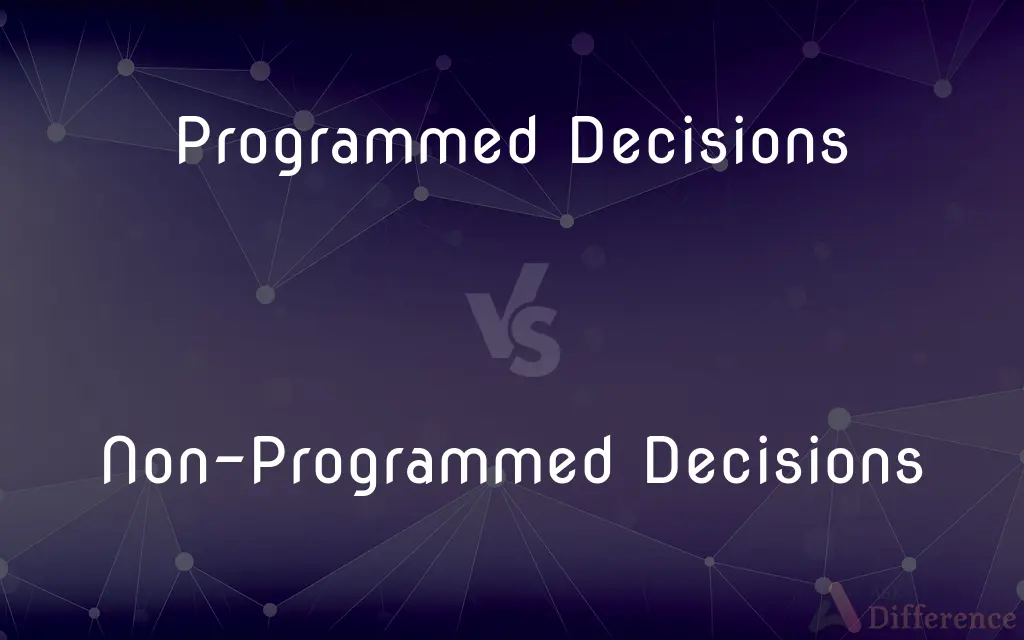Programmed Decisions vs. Non-Programmed Decisions — What's the Difference?
Edited by Tayyaba Rehman — By Fiza Rafique — Published on February 29, 2024
Programmed decisions are routine and follow established guidelines, while non-programmed decisions are unique, requiring custom solutions for complex, unstructured problems.

Difference Between Programmed Decisions and Non-Programmed Decisions
Table of Contents
ADVERTISEMENT
Key Differences
Programmed decisions are characterized by their routine nature, often recurring and allowing for a standardized approach. These decisions typically involve clear procedures or rules to follow, making them efficient and consistent for operational tasks. For instance, a company might have a programmed decision process for restocking inventory when levels fall below a certain point, ensuring a systematic approach to maintaining stock levels.
Non-programmed decisions, on the other hand, arise in response to unusual or complex problems that lack clear-cut solutions. These decisions require creative thinking, judgment, and bespoke solutions, often involving strategic planning and higher-level management input. An example of a non-programmed decision could be determining a company's response to a sudden market shift or a crisis situation, which would not fit into a pre-established framework.
The key difference lies in the nature of the decision-making process: programmed decisions are efficient for handling routine tasks and reduce the need for constant managerial oversight, while non-programmed decisions are essential for addressing novel or unpredictable challenges that require a more thoughtful, case-by-case approach.
The choice between programmed and non-programmed decision-making often depends on the level of uncertainty and the complexity of the situation. Programmed decisions are preferred for their time and cost efficiency in stable environments, whereas non-programmed decisions are crucial for navigating the uncertainties of dynamic, rapidly changing environments.
Comparison Chart
Nature
Routine, repetitive
Unique, complex
ADVERTISEMENT
Framework
Established guidelines
Custom solutions
Occurrence
Frequent
Infrequent
Level of Management
Lower to middle
Upper management
Examples
Restocking inventory, processing invoices
Strategic planning, crisis management
Compare with Definitions
Programmed Decisions
Reduces managerial burden.
Approval for standard office supplies is automated.
Non-Programmed Decisions
Demands creative solutions.
A startup pivots its business model in response to market feedback.
Programmed Decisions
Routine decision-making.
A retail manager orders more units when stock is low.
Non-Programmed Decisions
Required for complex problems.
Addressing a sudden shift in consumer behavior.
Programmed Decisions
Ensures consistency.
Discount rates are applied uniformly during sales.
Non-Programmed Decisions
Engages higher-level management.
Board members decide on merger and acquisition opportunities.
Programmed Decisions
Ideal for operational tasks.
Payroll is processed on a regular schedule.
Non-Programmed Decisions
Tailored for unique situations.
A CEO decides on a new market entry strategy.
Programmed Decisions
Follows a set process.
Customer returns are processed using a standard policy.
Non-Programmed Decisions
Involves strategic thinking.
Developing a response plan for unexpected competition.
Common Curiosities
How do companies prepare for non-programmed decisions?
Companies prepare through strategic planning, scenario analysis, and fostering a culture of innovation and flexibility.
Why are programmed decisions important for organizations?
They streamline operations, save time, and ensure consistency in routine tasks.
Can a decision be both programmed and non-programmed?
Generally, decisions are categorized as one or the other based on their nature and the approach required.
What triggers a programmed decision?
Routine operations or situations that have occurred before trigger programmed decisions.
Do non-programmed decisions always involve higher risks?
Yes, due to their complexity and the uncertainty of outcomes, they often involve higher risks.
How does technology impact programmed decisions?
Technology, especially automation and AI, enhances the efficiency and accuracy of programmed decisions.
Who is typically involved in making non-programmed decisions?
Senior management, experts, and sometimes external consultants are involved in making non-programmed decisions.
What role does data play in programmed decisions?
Data provides the factual basis required for making informed, routine decisions.
How do organizations train employees for non-programmed decision-making?
Through leadership development, critical thinking exercises, and exposing them to complex problem-solving scenarios.
When are non-programmed decisions necessary?
They're necessary in novel, complex, or unforeseen situations requiring customized solutions.
Can programmed decisions be ineffective in certain situations?
Yes, especially in rapidly changing environments where flexibility and adaptation are key.
How do businesses balance between programmed and non-programmed decisions?
By establishing efficient processes for routine tasks while remaining agile and responsive to unforeseen challenges.
Can non-programmed decisions become programmed over time?
Yes, as organizations learn and establish procedures from dealing with recurring complex situations.
Why is flexibility important in non-programmed decision-making?
Flexibility allows decision-makers to adapt to the unique aspects of each situation.
What impact do non-programmed decisions have on an organization's strategy?
They can significantly alter a company's strategic direction and competitive position.
Share Your Discovery

Previous Comparison
Blazer vs. Trailblazer
Next Comparison
Branding vs. MarketingAuthor Spotlight
Written by
Fiza RafiqueFiza Rafique is a skilled content writer at AskDifference.com, where she meticulously refines and enhances written pieces. Drawing from her vast editorial expertise, Fiza ensures clarity, accuracy, and precision in every article. Passionate about language, she continually seeks to elevate the quality of content for readers worldwide.
Edited by
Tayyaba RehmanTayyaba Rehman is a distinguished writer, currently serving as a primary contributor to askdifference.com. As a researcher in semantics and etymology, Tayyaba's passion for the complexity of languages and their distinctions has found a perfect home on the platform. Tayyaba delves into the intricacies of language, distinguishing between commonly confused words and phrases, thereby providing clarity for readers worldwide.














































